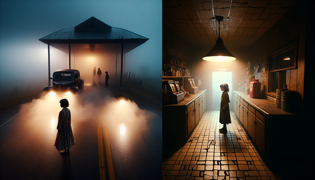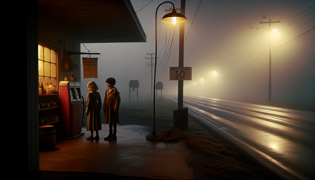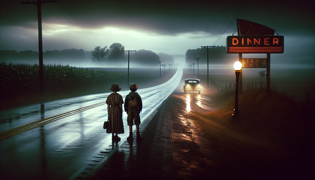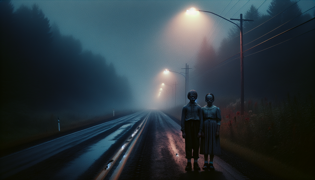Introduction
Mara Lewis eased her battered sedan down the winding county route, headlights slicing through the mist like a dull knife. The narrow ribbon of road was flanked by whispering pines, their tips bobbing in the darkness as if to warn trespassers. She’d dismissed countless ghost stories as nothing more than campfire filler, but tonight the air felt different—soggy with anticipation. Mile markers slipped by until an old diner sign flickered into view, the neon letters sputtering as if worried they might burn out before morning. Mara reached for her recorder, but the hush that followed was as heavy as a drawbridge slamming shut. Then she saw them: two children standing by the guardrail, their thin frames motionless against the silver haze. They looked no older than ten, boy on the left and girl on the right, wearing matching wool coats much too formal for a midnight stroll. Their faces were as pale as bone china, and even from twenty feet Mara could see their eyes—pools of absolute blackness that swallowed every glimmer of light. It sent her hair standing on end. Mara rolled down the window, the chill that rushed in felt as cold as a winter’s grave, and the children peered at her with hollow curiosity.
"Excuse me, ma'am," the boy said, voice a soft echo, "may we come inside?"
Equipped with curiosity and just enough bravado to talk herself down from the ledge, Mara called out, "Where are your parents? It’s dangerous out here at night."
They exchanged a glance that seemed to span centuries, the kind of look you give someone who’s just handed you a dagger but refuses to tell you where it came from. "They’re busy, ma’am," the girl answered, voice gentle as a shadow. "We just need a ride home."
The phrase sounded innocent, but something in their tone made Mara’s pulse hammer like a war drum. She fumbled for her door handle, every muscle screaming to flee. The night around her felt like a living thing—sliding into her lungs, weighing on her chest.
"You ain’t got a snowball’s chance in hell if you leave us here," the boy added, stepping closer, his words a soft threat that dripped over her nerves like cold syrup. Mara hesitated, caught between horror and compassion. Against her better judgment, she unlocked the door. That single act would change everything.
A Chilling Encounter
The car door shut with a snap that sounded like a pistol shot. Mara’s breath caught in her throat as the heater flickered, barely warming the air that felt more like a tomb. The children climbed in without a sound—no scraping of coats, no movement of belongings, just two bodies settling into the worn leather seats as if they belonged to the car all along. Mara forced a tight smile, tried to keep the recorder hidden beneath her jacket. The boy, eyes fixed on the steering wheel, murmured, "Thank you, ma’am." Each crisp syllable carried a weight beyond their years.
She turned to address them, but stopped short. Their eyes—vast, black voids—reflected nothing. Mara felt like she was peering into an abandoned mine shaft, full of unspeakable secrets. Outside, the road stretched ahead like a ribbon unspooling into oblivion. She flicked on the overhead lamp, the children shivered though the night was cold already. "Where should I take you?" she asked, voice brittle. They pointed down a side road flanked by towering oaks whose branches entwined overhead, creating a tunnel of ink.

Mara hesitated, heartbeat hammering. Every instinct screamed to drive away, to leave them in the fog where they belonged. But the girl's pale hand brushed the back of her seat, light as a whisper. That soft touch sent a shiver sliding down Mara’s spine, like a silent storm brewing inside her bones. "Please," the girl said, voice frail yet firm.
The highway signs faded, replaced by hand-painted boards warning "No Services Next 20 Miles." Mist coiled around the car like a snake, and the world outside felt unreal, as if they’d slipped beneath the surface of a dream. Mara’s headlights revealed signs of an abandoned gas station, its pumps standing like rusted sentinels and windows shattered by time. But the kids showed no sign of fear—only those all-seeing, black eyes.
She parked beneath a solitary lamp that flickered in protest, illuminating the cracked pavement like a broken smile. The boy turned to her. "We said it’s alright," he offered, voice calm as midnight water. "We just need inside for a while."
A sudden breeze rattled the carburetor, and Mara realized she’d left the engine running. Her chest tightened. She stood, nerves as taut as bowstrings, and led the children toward the building. The door creaked open before she reached it, an invitation—or a trap. And as she crossed the threshold, every shadow seemed to lean closer, curious to see if she’d survive what waited within.
Unraveling the Mystery
Inside, the air was stale—like bread left out too long to evoke any hunger. Shelves once stocked with snacks and motor oil were stripped bare, leaving only ghosts of commerce behind. Mara held her breath as she guided the children toward a back room where a lone calendar still hung on the wall, its dates frozen in October of last year. The girl ran her fingertips across the torn edge, eyes alight with an unspoken purpose.
"Do you remember where you lived?" Mara asked, voice low so the wind couldn’t carry her question away. The boy shrugged, shoulders rising like tiny mountains. He looked around as though searching for something lost. On a dusty countertop there lay an old newspaper clipping about two missing siblings from fifty years ago—blonde-haired twins vanished after a late-night stroll to the old mill. Mara’s heart lurched. The kids in her car matched the photos almost perfectly hair the same shade of wheat and uniforms identical to those mentioned in the faded article.

She showed it to them, but their faces remained unreadable. "We just want to go home," the girl whispered, voice echoing against the bare walls. "But the road is hard at night."
Mara found herself nodding, her skepticism tumbling away like leaves in fall. Every scrap of logic had fled, replaced by one burning question: were these children echoes of something past or truly alive? She rummaged through a dusty toolbox, searching for bandages when she realized with a jolt that neither child bore a single scuff, mark, or blemish. Their clothes, though dated, were pristine.
"The moon’s high now," the boy observed, glancing at a broken clock face stuck at 2:13. "We should leave before the tide comes in." His mention of tides on this inland highway made Mara frown.
Outside, the wind picked up, rattling the tin roof like bones knocking in the dark. The children stood side by side, as still and silent as statues. Mara pressed her palm to her recorder, willing herself to capture evidence that would explain the impossible. But when she looked back, the device was gone. It vanished as easily as morning mist.
Panic clutched her throat, but the children simply smiled, mouths curving like blades sharpened by time. "Don’t worry," they said in perfect unison, a voice both familiar and alien, "we’ll be good."
Mara realized in that frozen moment that kindness could be a prison. She stepped back, the floorboards creaking in protest as if they knew this was her last chance to flee. Outside, lightning split the sky with a deafening crack, illuminating the children’s eyes—two wells of endless night.
Confronting the Darkness
Mara’s pulse thundered as she backed away toward the door, each step a scream in her ears. The children mirrored her, gliding forward until they filled the doorway like shadows pooling beneath a doorframe. Outside, thunder rumbled, shaking loose memories of a childhood storm that left her trembling for nights on end. She realized the rain began without warning, drumming on the tin roof like an army of unseen spectators.
In her peripheral vision she spotted an old pump lever, bent but still attached to its base. On impulse, she lunged, yanking it free and brandishing it like a makeshift spear. The children halted, their black eyes widening ever so slightly. Mara’s hands shook, sweat making the metal slick as glass. "Stay back!" she shouted, voice quivering.

The boy tilted his head, as though pondering a riddle only he could solve. "You’re scared," he stated plainly. "We don’t want to hurt you." His words were as soft as a lullaby, but the air around them felt charged, ready to snap. Mara knew instinctively that this was the moment—either she drove them away or they would stay.
She took a shaky breath, recalling a phrase her grandmother used when danger lurked: "Fierce courage can light the darkest path." Her chest tightened, but determination sparked within her like kindling catching fire. With a sudden roar, she swung the lever in a wide arc. The children vanished in a swirl of mist and moonlight, leaving behind only the scent of damp earth and pine.
Mara stumbled outside, rain soaking her hair as if baptizing her in newfound belief. The children’s footprints—two tiny pairs—led from the station to the road, then stopped at the line where asphalt met grass. No matter how hard she searched, the prints ended there, as if they’d never existed.
Heart pounding like a restless drum, Mara returned to the car. The engine idled, its hum a lifeline. She swallowed her fear and looked out toward the darkness, half-expecting to see those obsidian eyes watching her. But there was only wet pavement glinting in the streetlamp’s glow.
She drove away without looking back, the road opening before her like a promise and a warning. Behind her, the station stood empty, its windows dark, the two black-eyed children gone without a trace. Mara knew some questions demanded more than answers—they demanded courage.
Conclusion
Mara Lewis never forgot the chill of that midnight encounter or the sense that something beyond reason had touched her life. In the days that followed, she scoured archives, interviewed locals, and even faced down her own skepticism in the search for closure. Yet each lead ended in dead ends—ghost towns with locked doors, records that vanished as if erased from history, and rumors whispered only in the darkest bars. Though friends told her to let the story die, to chalk it up to imagination, she couldn’t. The memory of those black voids came back to her like a cold wind through an open window. Sometimes, late at night, she’d swear she heard soft laughter on the wind or the faint tap of tiny shoes on her porch. Mara learned that not all mysteries are meant to be solved. Some are warnings—tales told by the darkness to remind us that courage isn’t the absence of fear, but the will to face it. And as long as the black-eyed children roam the highways of America, silence will never be a refuge again.


















